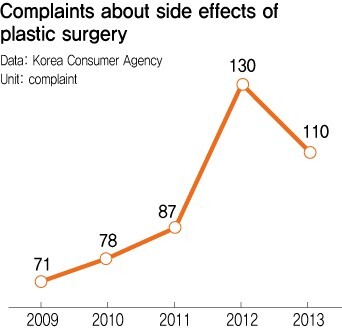hankyoreh
Links to other country sites 다른 나라 사이트 링크
Deaths lead to calls to regulate plastic surgery industry

By Park Su-ji, staff reporter
With several people dying recently of complications from plastic surgery, there are calls for corrective measures, arguing that the issue should be viewed from the perspective of the public’s right to health. Experts and advocacy groups are urging the authorities to strengthen monitoring and oversight of the safety of these operations while also instituting various regulations for inappropriate plastic surgery advertisements and mandating that plastic surgery clinics have medical equipment on hand for emergencies.
According to figures released by the Korea Consumer Agency on Mar. 12, the number of people who have complained about side effects from plastic surgery jumped from 71 in 2009 to 110 in 2013.
There were also many cases side effects from an operation resulted in death. On Mar. 6, a woman surnamed Park, 34, suffered respiratory difficulty that turned fatal while receiving rhinoplasty, or nose surgery. With the nose surgery, Park had received abdominal liposuction at the same plastic surgery clinic in the Sinsa neighborhood of Seoul's Gangnam district.
Four days earlier, a man in his 30s died in the hospital after receiving cosmetic jaw surgery in Busan. There was also a high school girl who had rhinoplasty along with blepharoplasty, the double eyelid operation, at a plastic surgery clinic in the Cheongdam neighborhood of Seoul's Gangnam district after taking the university entrance exam in Dec. 2013. She has been brain dead for the past three months.
While experts acknowledge the role of lookism in South Korean society, which drives people to have unwise operations, they now view this as a threat to the public right to health, urging authorities to take specific steps to regulate plastic surgery. In particular, they emphasize the urgency of having plastic surgeons give their patients adequate notice of the possible side effects of these operations.
“There needs to be a process by which patients are adequately informed about the side effects of plastic surgery and asked for their consent. Since this is not enforced, illegal consultations with counselors and coordinators hired by doctors are pervasive,” said Lee Sang-yun, director of research at Health and the World. “Competition has gotten worse as not only specialists but also general practitioners dive into the plastic surgery industry. As a result, the industry is failing to regulate itself.”
It has also been argued that it should be mandatory for plastic surgeons to have emergency medical equipment. According to data that Democratic Party lawmaker Choi Dong-ik provided during last year’s parliamentary audit, 77% of the 1,091 medical clinics offering plastic surgery have neither a defibrillator nor an artificial respiration kit, devices needed when the heart stops.
“A clinic that carries out a lot of jaw operations and other surgeries needs to have at least some emergency equipment,” said Lee Han-bon, a lawyer with MINBYUN-Lawyers for a Democratic Society. “This is an area that demands regulation.”
Another issue is that the Ministry of Health and Welfare has been taking a hands-off approach to plastic surgery because it is not covered by national health insurance.
“The Ministry of Health and Welfare does not guarantee the appropriateness of medical activity or the safety of new medical technology,” said Kim Jun-hyun, a member of the policy board for the Health Right Network. “The Ministry should at least assess the safety of operations offered by plastic surgery clinics through an official investigation.”
Women’s advocacy groups are calling for tighter regulations to curb the flood of advertisements for plastic surgery.
“Plastic surgery advertisements teach people to internalize a uniform standard of beauty and to get unnecessary operations,” said Kim Jin-seon, a member of the women’s health team for Womenlink.
“By providing the facts from only one side, these advertisements infringe upon the right to health by preventing not just some women, but indeed a majority of the public, from making an informed decision.”
Please direct questions or comments to [english@hani.co.kr]

Editorial・opinion
![[Editorial] Does Yoon think the Korean public is wrong? [Editorial] Does Yoon think the Korean public is wrong?](https://flexible.img.hani.co.kr/flexible/normal/500/300/imgdb/original/2024/0417/8517133419684774.jpg) [Editorial] Does Yoon think the Korean public is wrong?
[Editorial] Does Yoon think the Korean public is wrong?![[Editorial] As it bolsters its alliance with US, Japan must be accountable for past [Editorial] As it bolsters its alliance with US, Japan must be accountable for past](https://flexible.img.hani.co.kr/flexible/normal/500/300/imgdb/original/2024/0417/6817133413968321.jpg) [Editorial] As it bolsters its alliance with US, Japan must be accountable for past
[Editorial] As it bolsters its alliance with US, Japan must be accountable for past- [Guest essay] Amending the Constitution is Yoon’s key to leaving office in public’s good graces
- [Editorial] 10 years on, lessons of Sewol tragedy must never be forgotten
- [Column] A death blow to Korea’s prosecutor politics
- [Correspondent’s column] The US and the end of Japanese pacifism
- [Guest essay] How Korea turned its trainee doctors into monsters
- [Guest essay] As someone who helped forge Seoul-Moscow ties, their status today troubles me
- [Editorial] Koreans sent a loud and clear message to Yoon
- [Column] In Korea’s midterm elections, it’s time for accountability
Most viewed articles
- 1[Column] The clock is ticking for Korea’s first lady
- 2Samsung barricades office as unionized workers strike for better conditions
- 3[Editorial] When the choice is kids or career, Korea will never overcome birth rate woes
- 4S. Korea, Japan reaffirm commitment to strengthening trilateral ties with US
- 5[News analysis] After elections, prosecutorial reform will likely make legislative agenda
- 6Japan officially says compensation of Korean forced laborers isn’t its responsibility
- 7Why Israel isn’t hitting Iran with immediate retaliation
- 8[Editorial] As it bolsters its alliance with US, Japan must be accountable for past
- 9[Editorial] Does Yoon think the Korean public is wrong?
- 10[Guest essay] How Korea turned its trainee doctors into monsters